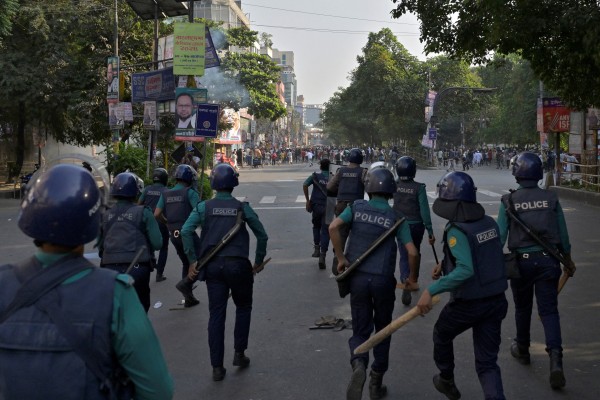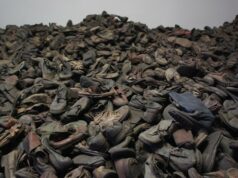
Bangladesh Interim Chief Adviser Professor Muhammad Yunus said the death sentence handed to ousted prime minister Sheikh Hasina delivered “important, though limited, justice” for those killed during the July–August 2024 uprising, even as the verdict ignited fresh turmoil across Bangladesh.
In a statement released by his press wing, Yunus said the tribunal’s ruling reaffirmed that “no one, regardless of power, is above the law” and described the victims—placed at around 1,400—as “students, parents, and citizens with rights,” not mere numbers. He said the case demonstrated that “lethal force, even from helicopters, was used against unarmed protesters” and called the judgement a step toward rebuilding the country’s damaged democratic foundations.
As the verdict circulated, Hasina issued an audio message through the Awami League’s official Facebook page, rejecting the charges as a political vendetta and branding the proceedings a “kangaroo court.” She urged supporters “not to worry,” insisting the allegations were “entirely false” and that the outcome was “just a matter of time.”
She has denied all accusations, which include murder, attempted murder, torture, deployment of lethal weapons, and killings in Dhaka and Rangpur during the July uprising. Under tribunal rules in the case documents, she may appeal only if she surrenders or is arrested within 30 days of the judgement.
Hasina, who has been in India since fleeing Bangladesh on 5 August 2024, was tried in absentia alongside former Home Minister Asaduzzaman Khan Kamal. Former police chief Abdullah Al Mamun appeared in person and turned approver. Prosecutors Gazi MH Tamim and Tajul Islam had sought the death penalty, arguing Hasina was “the nucleus around whom all the crimes committed during the July–August uprising revolved.”
Islam said she “should be sentenced 1,400 times”—once for each alleged death—but that “at least one” such sentence was necessary.
The verdict placed India in a delicate diplomatic position. Dhaka formally requested Hasina’s extradition “according to the extradition treaty existing between the two countries,” calling it India’s “obligatory duty” and warning that providing sanctuary to individuals convicted of crimes against humanity would be considered “an unfriendly act.”
New Delhi, however, sidestepped the demand. In an official response, the Ministry of External Affairs stated, “India has noted the verdict announced. As a close neighbour, India remains committed to the best interests of the people of Bangladesh, including peace, democracy, inclusion and stability in that country.” It made no reference to extradition.
Within hours of the sentencing, violence broke out across Bangladesh. In Gopalganj district, 10–15 members of the banned Chhatra League staged a protest march, attempting to block roads, burn tyres and ignite petrol-soaked jute mats. Eyewitnesses told Prothom Alo that the protesters gathered near Sheikh Russell Children’s Park in Tungipara and filmed themselves before dispersing as police intervened.
Unconfirmed reports said several people had been killed in the violence.
Gopalganj Sadar Officer-in-Charge Md. Shah Alam said that aside from “one or two incidents,” the situation remained under control as security patrols continued.
Security was also tightened around the house of Justice Golam Mortuza Majumder—chairman of the three-member tribunal—in Feni district amid concerns over reprisals. The tribunal, reconstituted after the fall of the Awami League government on 5 August 2024, delivered its ruling earlier in the afternoon.
Dhaka woke to an eerie stillness on Monday morning, with normally jam-packed roads nearly empty amid calls for a shutdown. As the day progressed, sporadic violence erupted across the capital. Crude bombs exploded in several areas, including Bangla Motor, Central Road and Karwan Bazar, according to The Daily Sun and PTI reports.
Since 10 November, attacks have repeatedly targeted the Mirpur headquarters and multiple branches of Grameen Bank—founded by Yunus—through petrol bombs and arson, killing a bus driver in one incident. Around 15,000 security personnel were deployed in the capital. “Anyone who sets a bus on fire or throws crude bombs with the intent to kill should be shot,” Dhaka Metropolitan Police Commissioner SM Sazzat Ali said.
Armoured carriers, water cannons and Rapid Action Battalion units patrolled the Secretariat, Supreme Court, Prime Minister’s Office, diplomatic enclave and the tribunal complex.
Clashes intensified near Dhanmondi 32, the former residence of Bangabandhu Sheikh Mujibur Rahman, where several hundred protesters gathered ahead of the verdict. Demonstrators attempted to breach police barricades, leading to baton charges, tear gas near Square Hospital, and the use of sound grenades. Protesters hurled bricks and repeatedly regrouped despite dispersal efforts. Two excavators were brought to the site, apparently to demolish what protesters described to The Daily Star as the remains of “fascist Sheikh Hasina”.
“Today, the tribunal will deliver its verdict against Hasina. We hope she receives the highest punishment,” one participant said.
Violence was also recorded across multiple districts. In Dibiapur, armed assailants stormed a marketplace, beating a cloth merchant who resisted intimidation and attacking family members who attempted to intervene. Panic spread as the attackers moved through shops with sticks and rods. Other regions reported arson, roadblocks made from felled tree trunks, and confrontations with security forces following the shutdown call previously issued by the now-disbanded Awami League.
Unrest had already been brewing overnight, with unidentified individuals torching a police station’s vehicle-dumping corner and detonating crude bombs outside the residence of an advisory council member to Yunus’ interim government. Two more devices exploded at the Karwan Bazar intersection. Multiple blasts were reported across Dhaka’s neighbourhoods.
While expected, the verdict and its fallout have plunged Bangladesh into one of its most volatile periods in recent years. Yunus’ emphatic endorsement of the tribunal, Hasina’s rejection of the charges, intensifying street unrest and India’s careful distancing on extradition together underscore the uncertainty facing the country’s political future.
In a career spanning three decades and counting, Ramananda (Ram to his friends) has been the foreign editor of The Telegraph, Outlook Magazine and the New Indian Express. He helped set up rediff.com’s editorial operations in San Jose and New York, helmed sify.com, and was the founder editor of India.com.
His work has featured in national and international publications like the Al Jazeera Centre for Studies, Global Times and Ashahi Shimbun. But his one constant over all these years, he says, has been the attempt to understand rising India’s place in the world.
He can rustle up a mean salad, his oil-less pepper chicken is to die for, and all it takes is some beer and rhythm and blues to rock his soul.
Talk to him about foreign and strategic affairs, media, South Asia, China, and of course India.




